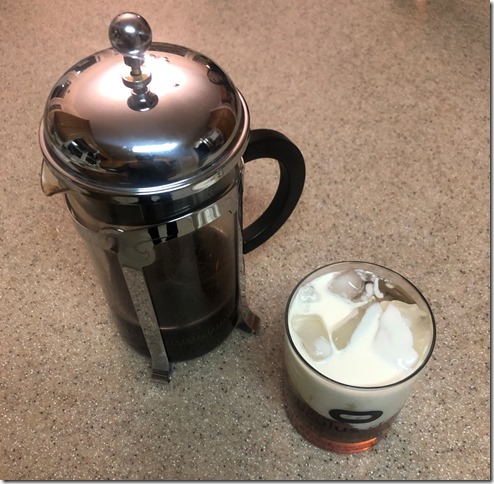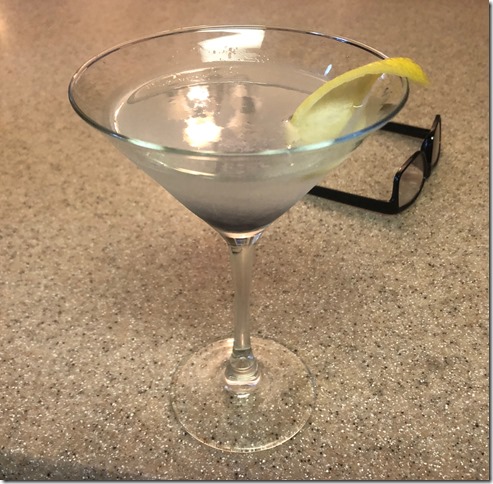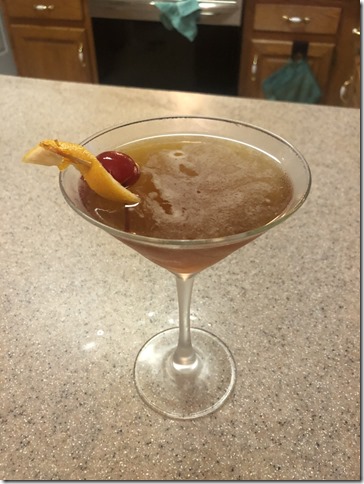The White Russian is famously the drink of The Dude. It is a three ingredient cocktail composed of equal parts vodka, Kahlua and heavy  cream. No garnish. I prefer it in an Oculus Rift novelty glass, but any old-fashioned glass will do.
cream. No garnish. I prefer it in an Oculus Rift novelty glass, but any old-fashioned glass will do.
My wife’s grand-parents and great-grandparents were White Russians. In the 1918 revolution her family retreated and retreated with the Tsarist forces through the Ukraine. Her great-great-grandfather and a cousin iconically died when their regiment was surrounded by the Reds in the snow. The Reds did not take prisoners. To be fair, the Whites didn’t either. And both took advantage of the war to act out pogroms on Jews, whom neither side trusted.
One of her great grand-fathers was sent to the Gulag for a 5 year term for blowing up a bridge. If the bridge actually existed, family opinion holds that his sentence would have been much more severe. Later, after walking home following the end of his 5 years in Siberia, he took advantage of the war to gather his family and escape from the Ukraine to Germany. German fliers had promised them a great life if they migrated west. Instead, the Germans placed them in a labor camp, where they stayed through the extent of the war. Once the guards had left the camp, they made their way to allied forces and eventually were granted passage to New York City, where they lived for several years before settling in the suburbs around Washington, D.C.
Their take-away from all this was that the Nazis were bad but the Soviets were worse.
I recently discovered that my mother is voting for Trump. I was a bit surprised, but not completely. My mother is Vietnamese and there are complicated factors involved which come down to: 1) a specific distrust of the Chinese, who in the past and currently are attempting to create a sphere of influence in that part of the world, especially as the Trump administration has withdrawn from foreign engagement; 2) anti-communism that grows out of a long history of communist atrocities in Vietnam as well as the trauma of being expelled from one’s own country and being forced to leave both family and ancestral graves behind; 3) Trump has been successful in portraying himself as being tough on China, despite general indifference to the plight of the Uyghurs or of the independence movement in Hong Kong.
The horror of communism is the basic belief in the plasticity of human nature and the belief that with proper education, reinforced with force if necessary, anybody can be made to believe anything. Combine this with an absolute belief in the righteousness of one’s cause as well as a cadre of cynical operators willing to carry out this political agenda, and you end up with the sort of destruction of norms and truth illustrated in the writings of George Orwell and Alexander Solzhenitsyn, films like The Death of Stalin, and the growing testimony about the Chinese Cultural Revolution.
But as strongly as I abhor the anti-humanism and anti-enlightenment baggage of communist movements (or maybe because of it) it is clear that a general sympathy for the working person, a desire to help those in need and an recognition of the need to address the consequences of global warming are not the essence of communism. The essence of communism is a disregard for truth and a belief that anyone can be made to believe anything and that norms are a weakness. These are not the traits of a Biden presidential candidacy.
Drinking down my White Russian, I coo privately over the prospect of Biden presidential victory and begin to confuse the two.
Sam Elliott tells us in The Big Lebowski that The Dude was the right man at the right time (which is also a perfect description of Joe Biden). The Dude has many faults. Among his virtues, though, is a degree of appreciation for what he expects from the world and a respect for norms. He is surrounded by somewhat extreme friends, but he also gives them space and grants them their personal dignity and recognizes their humanity. For all his 60’s radical rhetoric, he is ultimately a man of bourgeois tastes pursuing enlightenment ideals about interior decoration with a clear sense of human dignity and of what crosses the line of human dignity.
These are hard times and we need more Dude’s in the world. We also need more White Russians over here, bartender!


